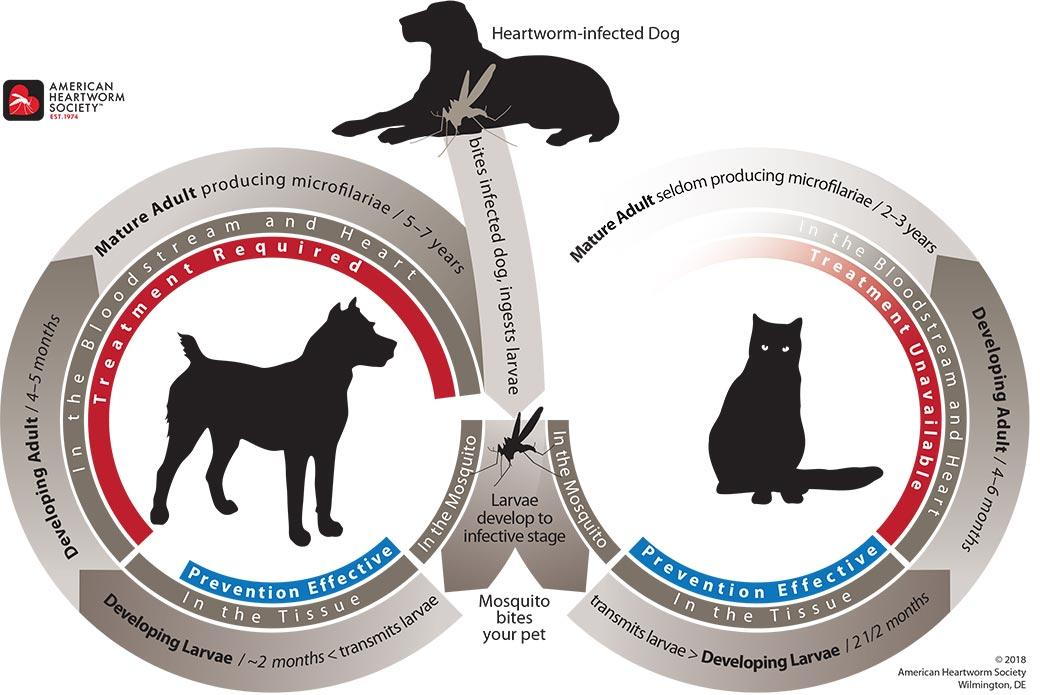Call us today!

- posted: Apr. 08, 2019
April is Heartworm Awareness Month
Heartworm Disease – What Is It and What Causes It?
Heartworm disease is a serious disease can result in severe lung disease, heart failure, other organ damage, and death. It can be found in pets, mainly dogs, cats, ferrets and wildlife such as fox, coyote or wolves. Heartworms are a parasitic worm,(about the diameter of thin spaghetti) that normally live free floating in the right ventricle of the heart and nearby blood vessels.
Heartworm is caused by a parasitic worm called Dirofilaria immitis. Its presence in blood vessels and chambers of the heart causes reduced heart function, reduced lung capacity and on occasion, death.
Heartworm disease is not contagious, meaning that a dog cannot catch the disease from being near an infected dog. Heartworm disease is only spread through the bite of a mosquito (intermediate host).
Inside a dog, a heartworm’s lifespan is 5 to 7 years. The number of worms living inside an infected dog is called the worm burden. The average worm burden in dogs is 15 worms, but that number can range from 1 to 250 worms.
The Heartworm Life Cycle:
The mosquito plays an essential role in the heartworm life cycle. Many species of mosquito can transmit heartworm and are found in Manitoba mosquito populations every year.
Adult female heartworms living in an infected dog, fox, coyote, or wolf produce microscopic baby worms called microfilaria that circulate in the bloodstream. When a mosquito bites and takes a blood meal from an infected animal, it picks up these baby worms, which develop and mature into “infective stage” larvae over a period of 10 to 14 days.
Then, when the infected mosquito bites another dog, cat, or susceptible wild animal, the infective larvae are deposited onto the surface of the animal's skin and enter the new host through the mosquito’s bite wound.
Once inside a new host, it takes approximately 6 months for the larvae to mature into adult heartworms. Once mature, heartworms can live for 5 to 7 years in dogs and up to 2 or 3 years in cats. Because of the longevity of these worms, each mosquito season can lead to an increasing number of worms in an infected pet.
What are the signs of a heartworm infection?
Signs can include an increased respiration rate, chronic cough, exercise intolerance, decreased appetite, lethargy, or abdominal distension. Your veterinarian may detect a heart murmur.
Consequences of illness, diagnosis and treatment:
In adult heartworm infections, worms can impair cardiac functions and can cause long term potentially fatal heart disease. Early treatment can have a good prognosis. Treatment involves 2 or 3 intramuscular injections of an adulticide product called Immiticide, followed by 4 to 6 weeks of reduced activity while heartworms slowly die and are slowly re-absorbed by the body.
Testing for heartworm:
The earlier heartworm is detected, the better the chances the pet will recover. There are few, if any, early signs of disease when a dog or cat is infected with heartworms, so detecting their presence with a heartworm test administered by a veterinarian is important.
The test requires just a small blood sample from your pet, and it works by detecting the presence of heartworm proteins. The test is processed right in the veterinary hospital. If your pet tests positive, further tests may be ordered. If negative, you can be issued your heartworm medication and begin administering on the date suggested.
How can I protect my pet from heartworm?
Prevention of infection is easier and less expensive than the treatment of an adult infection.
Prevention typically involves giving your dog either a monthly chewable or topical medication, starting 30 days after the first mosquitoes appear and continuing monthly until 30 days after the last mosquitoes have died. In Manitoba 6 months of prevention is usually sufficient (June to November). However, if you are travelling south for the winter months, you should talk with your veterinarian as you may want to extend the medication.
Avoidance of outdoor exercise during peak mosquito activity (evening, early morning) can help reduce, but not eliminate, the risk of mosquito bites.
Note that indoor pets are not immune to heartworm disease, as mosquitos can fly into a home or apartment through open doors or on people’s clothes and thus gain entry to the home.
Excerpts from:
Canadian Veterinary Medical Association: Dr. Kathleen Cavanagh, Online Editor, CVMA
Dr. J Scott Weese, Canada Research Chair in Zoonotic Diseases
American Heartworm Society
Manitoba Veterinary Medical Association Disease Fact Sheet
Reviewed by: Dr. Gita Gunson, DVM
Office Hours
9:00 am - 12:00 pm
1:00 pm - 5:00 pm
9:00 am - 12:00 pm
1:00 pm - 5:00 pm
9:00 am - 12:00 pm
1:00 pm - 5:00 pm
9:00 am - 12:00 pm
1:00 pm - 5:00 pm
9:00 am - 12:00 pm
1:00 pm - 5:00 pm
Closed
Closed


